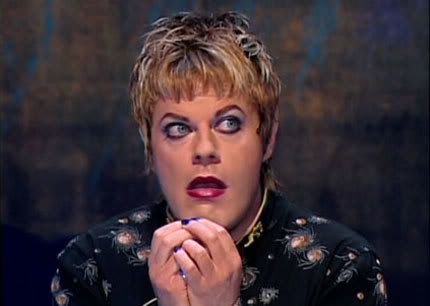. Lanier is the author of is the author of
"If you aspire to use computer network power to become a global force through shaping the world instead of acting as a local player in an unfathomably large environment, when you make that global flip, you can no longer play the game of advantaging the design of the world to yourself and expect it to be sustainable. The great difficulty of becoming powerful and getting close to a computer network is: Can people learn to forego the temptations, the heroin-like rewards of being able to reform the world to your own advantage in order to instead make something sustainable?"
Introduction
by John Brockman
We used to think that information is power and that the personal computer enabled lives. But, according to Jaron Lanier, things changed about ten years ago. He cites Apple, Google, and Walmart as some of the reasons.
In a freewheeling hour-long conversation, Lanier touches on, and goes beyond the themes he launched in his influential 2006 Edge essay
"Digital Maoism: The Hazards of the New Online Collectivism." What he terms "The Local-Global Flip" might be better expressed as "The Lanier Effect". Here's a sampling:
... "The Apple idea is that instead of the personal computer model where people own their own information, and everybody can be a creator as well as a consumer, we're moving towards this iPad, iPhone model where it's not as adequate for media creation as the real media creation tools, and even though you can become a seller over the network, you have to pass through Apple's gate to accept what you do, and your chances of doing well are very small, and it's not a person to person thing, it's a business through a hub, through Apple to others, and it doesn't create a middle class, it creates a new kind of upper class. ... Google has done something that might even be more destructive of the middle class, which is they've said, "Well, since Moore's law makes computation really cheap, let's just give away the computation, but keep the data." And that's a disaster.
... If we enter into the kind of world that Google likes, the world that Google wants, it's a world where information is copied so much on the Internet that nobody knows where it came from anymore, so there can't be any rights of authorship. However, you need a big search engine to even figure out what it is or find it. They want a lot of chaos that they can have an ability to undo. ... when you have copying on a network, you throw out information because you lose the provenance, and then you need a search engine to figure it out again. That's part of why Google can exist. Ah, the perversity of it all just gets to me.
... What Wal-Mart recognized is that information is power, and by using network information, you could consolidate extraordinary power, and so have information about what could be made where, when, what could be moved where, when, who would buy what, when for how much? By coalescing all of that, and reducing the unknowns, they were able to globalize their point of view so they were no longer a local player, but they essentially became their own market, and that's what information can do. The use of networks can turn you from a local player in a larger system into your own global system.
... The reason this breaks is that there's a local-global flip that happens. When you start to use an information network to concentrate information and therefore power, you benefit from a first arrival effect, and from some other common network effects that make it very hard for other people to come and grab your position. And this gets a little detailed, but it was very hard for somebody else to copy Wal-Mart once Wal-Mart had gathered all the information, because once they have the whole world aligned by the information in their server, they created essentially an expense or a risk for anybody to jump out of that system. That was very hard. ... In a similar way, once you are a customer of Google's ad network, the moment that you stop bidding for your keyword, you're guaranteeing that your closest competitor will get it. It's no longer just, "Well, I don't know if I want this slot in the abstract, and who knows if a competitor or some entirely unrelated party will get it." Instead, you have to hold on to your ground because suddenly every decision becomes strategic for you, and immediately. It creates a new kind of glue, or a new kind of stickiness.
... It can become such a bizarre system. What you have now is a system in which the Internet user becomes the product that is being sold to others, and what the product is, is the ability to be manipulated. It's an anti-liberty system, and I know that the rhetoric around it is very contrary to that.
... Essentially what happened with finance is a larger scale, albeit more abstract version of what happened with Wal-Mart, where a global system was optimized by being able to build data that could be concentrated locally using a computer network. It tremendously enriched the people who ran the network. It seemed to create savings for people initially who were the end users, the leafs of the network, very much as Google, or Groupon, seem to save them money initially. But then in the long-term it took away more from the income prospects of people than it could offer them in savings, very much as Wal-Mart did. ... This is the pattern that we'll see repeated again and again as new applications of computer networks come up, unless we decide to monetize what people do with their hearts and brains. What we have to do to create liberty in the future is to monetize more and more instead of monetize less and less, and in particular we have to monetize more and more of what ordinary people do, unless we want to make them into wards of the state. That's the stark choice we have in the long-term.
...if you're adding to the network, do you expect anything back from it? And since we've been hypnotized in the last eleven or twelve years into thinking that we shouldn't expect anything for what we do with our hearts or our minds online, we think that our own contributions aren't worth money, very much like we think we shouldn't be paid for parenting, or we shouldn't be paid for raking our own yard. In those cases you are paid in a sense because there's still something that becomes part of you in your life, for all that you did. ... But in this case we have this idea that we put all this stuff out there and what we get back are intangible or abstract benefits of reputation, or ego-boosting. Since we're used to that bargain, we're impoverished compared to the world that could have been and should have been when the Internet was initially conceived. The world that would create a strengthened middle class through what people do, by monetizing more and more instead of less and less. It's possible that that world could have never come about, but that was never tested. If we are absolutely convinced that this third way is impossible, and that we have to choose between "The Matrix" or Marx, if those are our only two choices, it makes the future dismal, and so I hope that a third way is possible, and I'm certainly going to do everything possible to try to push it.
Read on. Or better yet, treat yourself to an interesting hour of watching the video and engaging with Lanier and his ideas.
JARON LANIER is a computer scientist, composer, and visual artist. He is the author of You Are Not A Gadget: A Manifesto.
Video
Audio
A Conversation with Jaron Lanier [8.29.11]







 RSS
RSS






